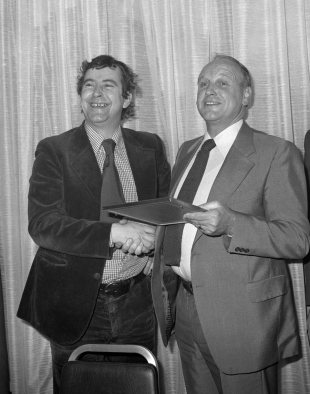Frank Keating

|
|||
|
Related Links
Teams:
England
|
|||
KEATING, FRANCIS VINCENT, died on January 25, aged 75. Among the small tribe of star sportswriters who trotted the globe in the late, great days of Fleet Street, Frank Keating was perhaps the most brilliant; he was certainly the most original and the best loved by his readers. He was a columnist on The Guardian for more than 40 years, though his heyday was from the mid-1970s to the mid-'90s. But his unique style - full of wit, wordplay and scintillating observation - helped revolutionise sports journalism in the posher British papers, which were still largely hidebound by public-school formality when he started.
In that sense, he played a similar role to his great Guardian predecessor Sir Neville Cardus half a century earlier. Like Cardus, he came to embody his newspaper's approach to sports writing. And, just like him, he took a romantic view of athletes in general and cricketers in particular which, on occasion, led him to make the journalistic pudding a touch too rich for literal-minded tastes. Unlike Cardus, he wrote on every sport, though he had little appetite for modern football, and wrote most often on cricket and rugby. But he painted best on the broad canvas offered by cricket.
Keating was born inHerefordshire, brought up in Gloucestershire (he was steeped in the lore and legends of "Glorse" cricket), and notionally educated at Catholic Douai, where he specialised in leg-spin and scrum-halfing and not much else. He evaded both national service and university, and in the 1950s began an unusually exotic wander round local papers in places as various as Slough and Salisbury in Southern Rhodesia.
He joined The Guardian in 1963 for a brief stint as a news sub-editor, before landing a grand-sounding job as editor, outside broadcasts, for the London ITV weekday station Associated-Rediffusion. The title disguised the fact that the channel did little outside broadcasting, an area dominated by the BBC: much of his work involved covering hockey, schools soccer and the like, designed not to attract audiences but to meet the legal quota for home-grown programming. His seven years in telly gave him enormous pleasure, and a rich fund of anecdotes; but, after the 1970 football World Cup, when ITV were starting to get more serious about sport, he had to retreat to The Guardian as a lowly sports sub.
However, an imaginative sports editor, John Samuel, spotted something and, though it took a while for the paper and Keating's penchant for what he himself called "florid flimflam" to come to terms with each other, his startling skills soon propelled him to journalistic stardom. His descriptive power was matched by an unusual empathy with the performers, which was particularly effective in cricket. In an era when the travails of the England team led to increasing strain between press and players, Keating was adept at straddling the two sides, partly through personal charm, partly because his journalism was almost always supportive. He was able to form lasting relationships with, for instance, both his fellow hellraiser Ian Botham and the stoical Graham Gooch, and wrote books with both. One of Frank's favourite stories was of an epic night's drinking with Botham at Indore that ended with the barman falling asleep at his post. Next day, as Keating and barman recovered, the other man present hit a 50-minute century.
The quotes in Keating's interviews might not always have stood up to a tape-recorder test, but - rather than twisting their opinions - he made his subjects sound more eloquent than they really were, so hardly anyone minded. "Some people would try and force things out of you," said an admiring David Gower. "Frank would just coax it out."
Keating's masterpiece was his book on the 1980-81 England tour of the West Indies, Another Bloody Day in Paradise!, when he set out to write a work of semi-fiction, but found that the facts (especially the death of the coach, Ken Barrington, and the team's expulsion from Guyana) were far more dramatic. His touching and affectionate Guardian piece the day after Barrington died is one of his best-remembered: "He had been so hale and full of beans. So dynamite chuffed at the end of the West Indians' innings in the morning. His nose crowded out the already jammed pavilion long-room bar. His smile illuminated it…" He covered the following winter's tour of India as acting cricket correspondent. Later, his appearances at major matches would become less frequent.
He did go to Sydney in 1993 and interviewed the aged and blind Harold Larwood, tapping out his pipe on the commemorative ashtray given to him by Douglas Jardine in 1933 "for the Ashes". "I think you've just emptied your ash in my most treasured possession," said Larwood calmly. In later years Keating found more pleasure in his marriage to Jane, his children, dogs and Herefordshire domesticity than in continual travel - eventually ill health made it hard for him to leave home at all.
But he remained a prolific columnist, in magazines as well as the paper, though he ceased being an innovator and became instead a master nostalgist, disguising a sharp memory and a vast library. His huge circle of friends and admirers would trek to Herefordshire or phone, to be greeted always by his customary cheery "M'dear!" His friend and rival columnist Patrick Collins said: "He possessed the priceless knack of finding jewels where nobody had thought to look, and describing them with a brilliance which nobody could hope to rival."

